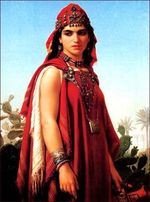Template:Pictorial-Islam-options: Difference between revisions
| [checked revision] | [checked revision] |
mNo edit summary |
mNo edit summary |
||
| Line 30: | Line 30: | ||
<option weight="1">{{Pictorial-Islam|1=Qur'an and Semen Production (Qur'an 86:7)|2=[[File:Hippocrates.jpg|190px|link=Quran and Semen Production]]|3=This article analyzes the various attempts to show that the Qur'an correctly describes semen production from between the “sulb” and the “tara’ib” in verse 86:7. | <option weight="1">{{Pictorial-Islam|1=Qur'an and Semen Production (Qur'an 86:7)|2=[[File:Hippocrates.jpg|190px|link=Quran and Semen Production]]|3=This article analyzes the various attempts to show that the Qur'an correctly describes semen production from between the “sulb” and the “tara’ib” in verse 86:7. | ||
There are | There are several distinct classes of explanations, and none of them are supported by modern scientific knowledge and are frequently conflicting. For example, Ibn Kathir refers to tara’ib as a female organ, while other tafsirs claim it belongs to the man. Another conflict is the definition of sulb to mean either the backbone or the ‘hardening’ of the loins. ([[Quran and Semen Production|''read more'']])}}</option> | ||
Revision as of 08:27, 18 March 2014
Also see: Template:Pictorial-Islam
|
